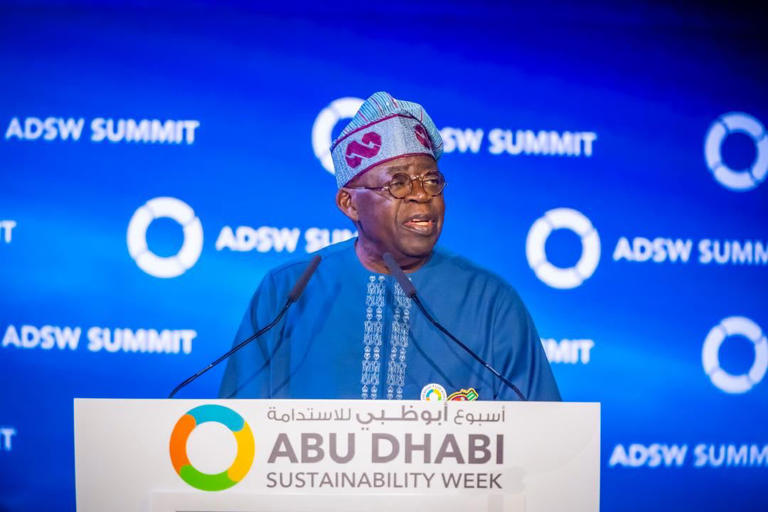- Safiu Kehinde
President Bola Tinubu has reaffirmed Nigeria’s commitment to achieving net-zero carbon emissions by 2060.
Tinubu stated this during his address at the ongoing 2025 Abu Dhabi Sustainable Week (ADSW) Summit on Wednesday.
Speaking on the topic “From Climate Imperatives into Economic Prosperity: Bridging Africa with the Global Energy Future,” Tinubu held that the topic resonated deeply with Africa’s aspirations and challenges.
He further expressed that Nigeria, as Africa’s most populous nation and one of its largest economies, recognised its responsibility to demonstrate the required leadership on these matters.
This, according to the President is currently taking place under his administration with gradual transition to clean and renewable energy through the introduction of Compressed Natural Gas and Electric Vehicles.
“As Africa’s most populous nation and one of its largest economies, Nigeria recognises its responsibility to demonstrate the required leadership on these matters.
“We have embraced a vision of sustainability that aligns with global aspirations while addressing local realities.
“Our efforts are anchored on three pillars: Energy Transition, Climate Resilience, and Sustainable Development. My Administration recognises the importance of reducing carbon emissions and a just transition to clean and renewable energy, promoting environmental sustainability and economic growth.
“Esteemed participants, our energy transition plans, like many nations, are aimed at diversifying energy sources and reducing dependency on fossil fuels; prioritising the transition to cleaner energy sources as a cornerstone of our national development strategy. Nigeria is committed to achieving net-zero emissions by 2060, in line with global climate objectives.
“We are developing the infrastructure to utilised Compressed Natural Gas and Electric Vehicles. Nigeria is also investing substantially in the generation, through exploration, of efficient and internationally certified data required to export our solid minerals and critical metals in support of the green energy transition.” Tinubu said.
He further disclosed Nigeria’s effort in building climate resilience through the implementation of climate-smart agricultural practices to enhance food security while reducing environmental impact.
“Building resilience against the adverse effects of climate change is essential for safeguarding our African communities and economies. Nigeria is implementing climate-smart agricultural practices to enhance food security while reducing environmental impact.
“The government has approved several developmental and sustainable policies such as the National Clean Cooking Policy which aims to promote clean energy, environmental and health benefits and socio-economic development in our region.” Tinubu said.
Meanwhile, Tinubu highlighted deforestation, desertification, coastal erosion, flooding, and pollution as the environmental challenges facing Nigeria amongst many other negative impacts of climate change.
He also decried the annual shrinking of the Lake Chad continues to shrink every year.
These issues, according to him, threaten the livelihoods of millions of Nigerians.
Tinubu disclosed that his government is working with local communities to implement solutions to mitigate these effects and help build resilience in the face of environmental changes.


